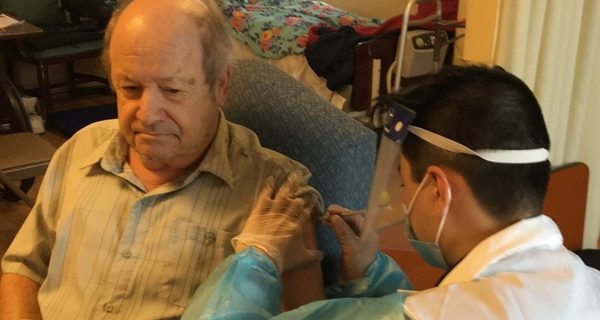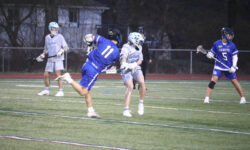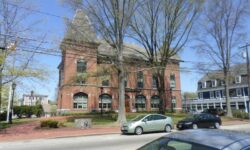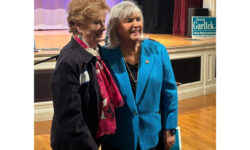Medway’s Ted Maiorana, a retired Deputy Chief from the Boston Fire Department receives the first shot of the Covid vaccine.
By James Kinneen
Hometown Weekly Reporter
Because COVID-19 has struck nursing homes so hard, it only makes sense that they would be first in line to receive the new vaccines. Last Monday, CVS and Walgreen’s Pharmacies set up clinics in nursing homes and long-term care facilities to distribute the vaccine, although they would need to return to administer the second dose. Among the facilities that were part of this rollout were the Thomas Upham House in Medfield.
The Thomas Upham House in Medfield is a skilled nursing and rehab facility that houses people both in their nursing homes and who are going through inpatient rehab. They have a capacity for 42 residents, making them, as administrator Denise Thisse Allen explained, a small nursing home where “everybody knows your name, everybody knows your family’s names, and you’re not just a number. You really are part of a family here.”
Thisse Allen was contacted by the federal Government with the decision of choosing Walgreen’s or CVS to set up a vaccination clinic. She chose CVS, since there is already one in Medfield, and saw three CVS employees come to administer the vaccine. The vaccine was offered to all residents and staff that wanted it; 45 staff members and 29 residents opted to receive the vaccine.
“We had to arrange ahead of time. We had to get everyone’s insurance card, that’s just for the administration copay fee or whatever it is, but the vaccine itself is free,” she explained. “Anyone who wanted it had to give us a copy of their insurance card as well as a three-page consent form, and then once we got that, they’d read all the stuff and we plugged them in. It started at eleven in the morning and ended at five in the afternoon, so we tried to say ‘we know this person is working three to eleven, so we’ll try to make it more convenient for them and make it at quarter to three’ so it was kind of just plugging them into the spaces. There was one person doing the vaccination, one person on the computer and the other one was kind of a facilitator, those were the CVS people. We had three people in a slot, so from 11 to 11:15, every five minutes, somebody got a new injection and then they went into the other room, socially distanced, and we had one of our RN’s on duty to be the monitor to make sure there were no side effects for fifteen minutes. Although we’re upping that number to thirty minutes.”
Thisse Allen expects more staff and residents to be vaccinated. Because the vaccine has to be administered in two stages, CVS will be returning to administer the second part to those who received the first, but will also be available to give the first shot to those who opted not to get it last time. Allen thinks many people that were hesitant to get the vaccine in fear of adverse side effects will be willing to get it then, after seeing that everything went fine among those who got it earlier.
Thisse Allen said that unlike the flu vaccine, which the state mandated, staff is not required to get the vaccine. There are also no financial incentives for them or the residents to get it, nor are there any punishments (as in 'you can’t go here, or can’t do this, unless you got the vaccine') for either group.
But if you think the push for the vaccine at the Thomas Upham House is due to having witnessed the results of COVID sweeping through a nursing home, you’d be wrong. Even before vaccinations, the Thomas Upham House has been spectacularly successful in their controlling of COVID, with none of their patients having been affected by the coronavirus. Instead, Allen believes the push to get vaccinated comes from a desire for a peace of mind.
“I think the people want to have more comfort in their lives. I got the vaccine and I know I’m most likely fifty percent better off than I was a week ago, and I will be ninety five percent in another two weeks when I get the next vaccine. It takes up to two to three weeks to be effective, but it’s a peace of mind thing. I think that’s what they want more than anything. Our residents are people who’ve been through a lot and seen a lot in their lives, and I think they’re willing to participate to make everybody’s lives better and get rid of that fear of ‘what if?’ We’ve done a great job at having zero, and I’m knocking hard on wood, but it’s really nice.”
Thisse Allen noted that they received the Pfizer vaccine, and that although it had to be stored at such a cold temperature, “it didn’t feel cold when injected, it felt like any other shot.”
It might have felt like any other shot, but the amount of lives it could save make it unlike any in recent memory.









